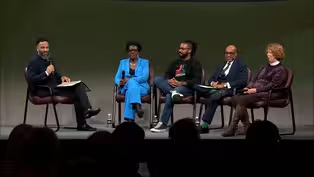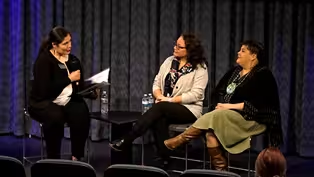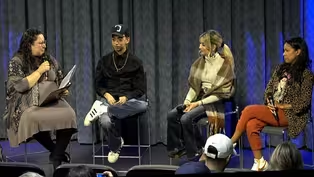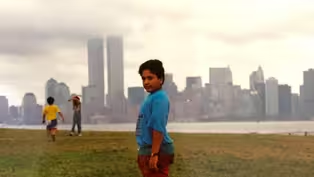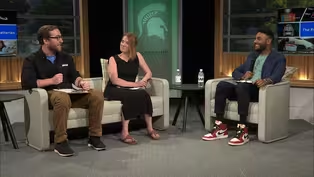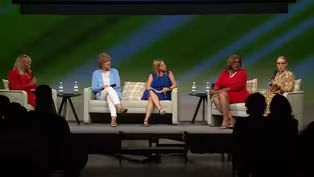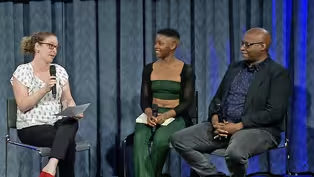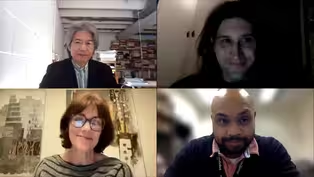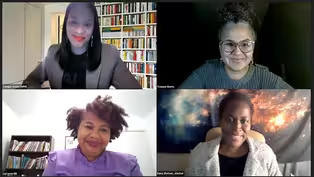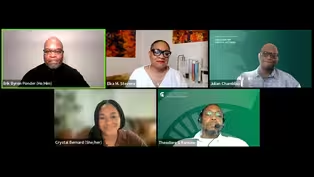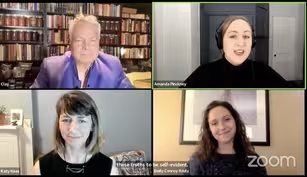
Panel Q&A - Brenda's Story: From Undocumented to Documented
Special | 25m 44sVideo has Closed Captions
Panel discussion following the film Brenda's Story
Panel discussion following the film Brenda's Story. Dr. Ruben Martinez (Ph.D MSU Professor & Moderator) . Brenda Pilar-Ayala (MSU Senior, Bailey Scholar, and MSU Homecoming Court Rep.). Dr. Isabel Montemayor-Vazquez (Ph.D Executive Director of the Hispanic Latino Commission of Michigan). Jason Howard (MSU Media and Information Graduate.
Problems playing video? | Closed Captioning Feedback
Problems playing video? | Closed Captioning Feedback
WKAR Specials is a local public television program presented by WKAR

Panel Q&A - Brenda's Story: From Undocumented to Documented
Special | 25m 44sVideo has Closed Captions
Panel discussion following the film Brenda's Story. Dr. Ruben Martinez (Ph.D MSU Professor & Moderator) . Brenda Pilar-Ayala (MSU Senior, Bailey Scholar, and MSU Homecoming Court Rep.). Dr. Isabel Montemayor-Vazquez (Ph.D Executive Director of the Hispanic Latino Commission of Michigan). Jason Howard (MSU Media and Information Graduate.
Problems playing video? | Closed Captioning Feedback
How to Watch WKAR Specials
WKAR Specials is available to stream on pbs.org and the free PBS App, available on iPhone, Apple TV, Android TV, Android smartphones, Amazon Fire TV, Amazon Fire Tablet, Roku, Samsung Smart TV, and Vizio.
More from This Collection
Panel discussions following WKAR film screenings. Featuring filmmakers, policy makers, community partners and more.
Panel Q & A - The Cost of Inheritance
Video has Closed Captions
Panel discussion following the film The Cost of Inheritance. (30m 59s)
Video has Closed Captions
Panel discussion following the film Warrior Lawyers. (33m 42s)
Panel Q & A – First Voice Generation
Video has Closed Captions
Panel discussion following the film First Voice Generation. (31m 2s)
Video has Closed Captions
Panel following the film "American Jedi." Discussion features the film’s producers. (48m 46s)
Panel Q & A – NOVA Science Studio Showcase
Video has Closed Captions
WKAR showcases highlights from the NOVA Science Studio project. (53m 35s)
Panel Q & A – Building the Reading Brain
Video has Closed Captions
Panel discussion following the WKAR original film, Building the Reading Brain. (36m)
Video has Closed Captions
Panel discussion following the film Afrofantastic. Featuring filmmaker Julian Chambliss (29m 6s)
Panel Q & A – Free Chol Soo Lee
Video has Closed Captions
Panel discussion following the film Free Chol Soo Lee. (29m 48s)
Panel Q & A - Storming Caesars Palace
Video has Closed Captions
Panel discussion following the film Storming Caesars Palace (25m 19s)
Video has Closed Captions
Panel discussion following the episode Afrofuturism, from the Artbound series (33m 56s)
Panel Q & A - Benjamin Franklin
Video has Closed Captions
Panel discussion following the film Benjamin Franklin. (21m 46s)
Video has Closed Captions
Panel discussion following the film Unadopted. (31m 45s)
Providing Support for PBS.org
Learn Moreabout PBS online sponsorship- Hello and welcome.
I'm Ruben Martinez, professor of sociology at Michigan State University.
And it's my pleasure to welcome you tonight to the screening of Brenda's story from undocumented to documented.
As much as we'd love to have all of you in person, we're thankful to have this opportunity to connect online and bring you this film followed by our discussion.
Before we get started with the discussion I have a couple of quick housekeeping items.
First, events like this from WKAR are made possible with support from people like you.
Thank you to those of you who have donated to WKAR.
If you're not a WKAR donor yet you can easily become one by going to the donate to WKAR link on this page or call 517 884 4700.
Again, that's 517 884 4700.
Second for tonight's discussion, please enter your questions for our panelists in the comment box, and I'll put them to the panelists as time allows.
The film you have just seen has already won two awards from the Broadcast Education Association.
One is the Diversity and Inclusion Creative Award, which and I quote, recognizes creative works that diversifies media content by telling stories that often don't find a place in the media universe, end quote.
The second is the award of excellence in the mixed pedagogical category of the faculty video competition.
My congratulations to the team that produced the film.
Now I'd like to introduce the panelists.
First, Isabel Maontemoyer-Vasquez is Executive Director of the Hispanic Latino Commission of Michigan.
She is a trained sociocultural anthropologist and former faculty member.
With us also is Brenda Pilar-Ayala the subject of the film.
She is a senior majoring in psychology and political science with an emphasis on pre-law in the college of Social Science at Michigan State University.
And then we have Jason Howard, who is one of the members of the film making team and a Michigan State University media and information graduate with a minor in documentary production as well as information technology.
Welcome panelists.
Thank you for joining us.
So the first question is for Isabel, what was the most impactful part of the film that you just, are a part of?
- Yeah, I think there were two places in the film that just really struck chord with me.
The first was closer to the beginning when we saw Brenda in the parade and was just screaming with excitement and joy to witness what her daughter had accomplished and how embedded and entrenched her not only her daughter but her family was an American society, right by seeing her daughter participate in that parade.
And then the second part that I think struck me the most was when Brenda was discussing in the film the individual, the officer that was reviewing her case with her and at the very end of that conversation she said that she questioned it herself that she couldn't believe the reality of that moment, that she was afraid that it could be rescinded or taken away from her.
And I think that just speaks to the preliminary of the situation of these individuals that they're kind of juxtaposed betwixt and in between these situations and even in the moment when they're receiving good news they're still questioning the authentic city of what's happening to them.
So those were the two pieces that I think struck me the most.
- Thank you, so much stress.
They can't believe when it's happening for real.
- Yeah.
- Pilar what was the most impactful part of the film for you?
- I also think that sharing that footage for my trip down to the US Council in Mexico at the border was the most I because that's something that a lot of people don't have to go through.
And they're fortunate for that reason, just for simply born here in the US and being able to capture that footage and share it here with everyone else who may not be familiar with the process I think was the most impactful for me.
- Okay, and Jason, I know that you were behind the camera and doing other technical things but you've seen this many times you've been editing it.
What was impactful for you?
I mean listening to it and working on it.
- Yeah, so being the filmmaker also kind of outside of the situation, I only had like a general knowledge of the situation and what was so impactful for me was actually, putting faces and knowing the people and the situation.
It was just so impactful that it came down to a personal level for it.
- Thank you.
So what are some of the ways that MSU and the State of Michigan can help undocumented and DACA students, Pilar You wanna answer that?
- Yes, thank you.
So there's a lot of ways that MSU in general and State of Michigan can help undocumented or DACA students.
Most importantly, the financial aspect is very important.
Most recently I found out at MSU there's a specific committee that's dedicated to allocating funds for students and I question why that committee or people at MSU haven't put together a budget or resources, financial resources for DACA students.
Most recently, someone from the department who helps the president here at MSU reached out to me to let me know that he would be saying my name giving me a shout out at a speech that he's saying at a graduation ceremony next weekend.
And the simple fact that they want to shout me out and high my accomplishments at MSU shows that DACA students and undocumented students belong here at MSU yet despite of the obstacles that we have base they want to highlight us but they don't wanna financially support us.
So I think it's very important if they want more students here at MSU that can contribute financially to their institution and also include diversity and the richness of the university.
I think it's really important that MSU starts with financial aid first for DACA students.
- Thank you.
Isabel, what about you?
What do you think MSU in the State of Michigan can do to help the undocumented, DACA students?
- Well, I would agree with Brenda when it comes to Michigan State and with regard to the state, I think, the labor, the department of labor and economic opportunity where the Hispanic Latino Commission is located is a wonderful resource in creating economic opportunity for DACA students so that they can achieve upward social mobility, right.
So by creating more jobs, sustainable jobs and technical training and providing access to those trainings and working with different organizations, nonprofits that already provide those resources to amplify them and get the out to the DACA students.
- Thank you.
And Jason, I know when I was interviewed it was at the start of the pandemic.
And so this film was produced during the pandemic.
How was the production of the film during the pandemic different from normal times for you?
- Yeah, so a lot of the interviews gathered were before the pandemic and quite a few years before actually.
And so those sets would typically have a few more people compared to when we were during the pandemic we had two people on set and then Jerry, the director, we brought her in through Zoom in order to minimize the amount of contact.
We were all wearing masks when on set and then socially distanced.
So we were a little farther away than normal.
And we were in controlled environments using a lot of of sanitary wipes and cleaning everything up.
So it was a little bit of a change of pace but we tried to keep it as we could for everybody.
- Thank you.
And Pilar, going on with the idea of the pandemic, how did COVID-19 impact on documented, DACA students differently when compared to the general student population at MSU?
- Well, I think the most important fact to know is that when the first stimulus came out and although I did receive it because I have a green card I did have family members who are still under DACA or undocumented or sorry, undocumented that don't have the social security number.
And because of that, they were unable to receive that financial stimulus, which was a really great benefit for those of us who did receive it.
And especially during COVID, when it lot of people who lost their jobs they just didn't receive the financial help even though they did work and pay taxes.
- Thank you, Isabelle, you might not know how, what was going on at MSU, but in general what would you say that was different for DACA students during the pandemic?
- Well, as we know, the pandemic impacted the Hispanic Latino population in a significant way, disproportionately in comparison to the majority population and in particular because a lot of Hispanic and Latino individuals work and the front lines, right.
So they didn't have the luxury of staying at home.
So I think it especially impacted DACA students because they face kind of this, extra burden of having to provide and supply a stream of finance to their families in many cases, their parents or siblings, may not, have been able to work because they were ill.
So that maybe created an extra stress or it maybe created extra stress or an extra burden on the student who already is trying to manage attending classes virtually for many of them it's probably new something they were getting accustomed to.
And then probably working at the same time.
So, it's multiple kind of intersecting challenges that only add to the burden and the stress that can have long term psychological and physical kind of health ramifications, so.
- Thank you.
So more generally beyond MSU, what should higher education institutions and the State of Michigan do to help undocumented and DACA students obtain their college degrees?
Isabel.
- Yeah, we were talking about this a little bit ago in, here in the State they're they already, exists in state tuition for DACA students.
There's certain qualifications obviously I think they have to have lived and gone to school for at least five years and graduated from a high school.
There's still challenges with that.
Obviously, it's not an easy win all the time for every student.
But there are certain policies in place that do take away some of that added burden.
I think colleges and universities can work in tandem with nonprofits and private donors and private organizations to facilitate scholarships and other avenues for funding because in many cases, it's the financial side of things that create that barrier to completion of higher education.
- Thank you.
Brenda, do you have a perspective on this?
- Yeah, so I would like to add, when I came to MSU I initially was not granted in-state tuition despite pro providing all the proof that they required such as graduated from the high school, my parents' taxes, home insurance but because I'm a self advocate, I call the office and through that way, I was able to be granted in-state tuition, but someone who's not a self advocate who doesn't know how to navigate the system or is a first generation college student.
They might not have done that.
And aside from that, I think colleges across the state can even designate a certain person 'cause when it came to MSU I was bouncing between different offices because no one could answer the questions that I had.
So even just having one designated person or certain website that can answer these question for undocumented or DACA students I think that would be really helpful as well.
- So it's important for these public institutions to make their criteria available to the students so that they know what needs to be done, right.
And what are the criteria that they need to meet.
Going from the state of Michigan to the national level the federal programs, are there federal programs and policies that you would like to see enacted, Isabel?
- Yeah, ideally a path to citizenship.
I think that's the goal, right.
I think that's what we've been talking about for years now.
We don't like to see these students these young people, kind of in limbo, we don't wanna see their families in limbo but especially these young people who have lived their entire lives practically here in the United States, this is pretty much the only country they know, giving them a certain sense of security and being able to provide a policy at the federal level.
That really just proves that the time effort, energy and contributions that these individuals have made over the years to our economy and to this country in general, are valued and honored and they are participating, I always say they're participating citizens.
They really are.
So why not create, a path to citizenship for these individuals?
- Thank you.
Brenda, what do you think the federal government could do to make it easier for the DACA students and the undocumented students to be able to succeed, attend have access to and complete their college degrees?
- Financial resources is a very huge component of being able to not only attend college but be able to complete the college degree.
I would like to see specifically the State of Michigan or the federal government implant something nationwide.
For example, in California and Texas they have the resources, they have financial aid for DACA and undocumented students.
That's something that we don't have here in Michigan.
And that's something that I would like to see.
- That's great.
Yes, it's very important that the students have access to the financial funds that are available to students.
So I'm interested in knowing if there are any students, any questions from our viewers Those of you who are viewing, please submit your question in the comment box and we will see if we can get to them before we conclude tonight.
I don't see any questions yet.
So do you have any concluding remarks, Isabel?
Let's go around and see if we can have some concluding remarks.
- Well, before I, give any kind of concluding remarks, I hope I can ask a question of Brenda myself.
- Okay - We understand that graduation obviously was a great achievement for you, but you're very active you were very active at your university.
Maybe you could speak a little bit about some of the other achievements that you have, or large milestones that you've met within the recent years as a participating American.
(chuckles) - Oh, thank you.
I would say the most memorable accomplishment so far is being on MSU Homecoming Court, just because I've been able to use my platform to advocate for DACA and undocumented students and show that we are on campus and we contribute greatly and need the resources to stay on campus.
But my most recent accomplishment this summer, I will study in Europe and that's something that would not be possible without my green card and even without DACA to begin with.
And with my research there in London I hope to study within the realm of financial or sorry law and foreign policy, and use that to bring more knowledge into my community here in Lansing.
- Wonderful, wonderful.
- Thank you.
- So, Jason, tell us a little bit about the awards that the film has received.
- Yeah, so the Broadcast Education Association is a national level organization and they just I think it was last Saturday, they awarded, they had their presentation of the award in Las Vegas, along with the NAB.
Unfortunately, I didn't get to attend, so.
- Is this one of the first films that receives an award in your experience?
- What was that?
- Is this the first film that has received an award in your experience that you've been on, one of the films that you've been on?
- I've actually been nominated for awards through the NAB but I've never gotten an award for the film, but I have had some films nominated there.
- Great, well, congratulations.
Okay.
Isabel, final comments.
- Yeah, first and foremost, it was a complete joy to work on this film, and an honor and a privilege to be considered.
And when I say an honor and privilege, just an honor and a privilege to be a part of Brenda's story, right.
To hear it, to see it and to advocate for individuals in a similar situation last week, Friday Brenda participated in the statewide Hispanic Latino graduation ceremony.
And it was just so beautiful to see that accomplishment and really uphold that the value, right.
In university education and completion of that degree.
So I would say that my biggest takeaway and piece that I'd like to share is just that kind of the same thing we've been saying this whole time that these individuals, DACA recipients are contributing members of society.
And I think we all hope that in the near future there will be a federal policy that leads to a pathway citizenship so that they have stability.
And so that they're not left in a space of kind of the unknown.
So yeah, once again I appreciate the opportunity.
- Thank you.
And we do have a question from one of our viewers, Brenda and that is the emotional stress has been high for students during the pandemic.
And it's been especially high as you've noted for undocumented, DACA students.
How can students cope on MSU campus and elsewhere with the kind of stress that has been brought on by the pandemic?
- So specific at MSU I know they, we do have a lot of great resources as far as like counseling, the CAPS office.
So that's a really good resources.
I know there is some different like workshops with therapists that students could attend, especially for like LGBTQ students or Latino students that could all share because they have usually similar experiences.
So I would highly suggest attending those.
- And can you tell our viewers what CAPS stands for please?
- Yes, it's the counseling services office here at MSU.
- Wonderful.
So those resources are available for all students - And they're free.
- They're free.
Wonderful.
And let's see, we have another question.
I think that's coming in here, that is as community advocates, what can we do to help raise more awareness that creates real change through policies and legislation that can support, undocumented and DACA students?
What can the community advocates do, Isabel?
- Yeah, I think really paying attention to legislation and becoming informed.
A lot of times people don't realize how much legislation at the state level and at the federal level can impact the daily lives of individuals.
And especially in the Hispanic community here in the state of Michigan, we're one of the fastest growing populations.
And I feel oftentimes there is a disconnect between legislative policy and, kind of the the daily happenings or the daily lives of, the individuals who are deeply impacted and affected by policy.
So I think being aware and, kind of being informed and then advocating, regularly for changes in policies that contribute to the overall kind of wellbeing of undocumented individuals and DACA recipients.
So not just, federal policy, but like I said at the state level as well, there obviously are a lot of changes that need to take place.
And it starts with becoming informed as to what laws are being proposed, introduced and really advocating.
- Thank you.
And I think we gonna close it up.
Brenda, do you have any final comments that you'd like to make for our viewers?
- Yes.
I would just like to thank everyone for watching especially Jerry for allowing me to be part of this project.
A lot of the times we hear I'm self-made but rather I would like to say that I'm community made because if it wasn't for my here in Lansing and across the state, I don't think I would be where I am today and have been able to like share my story.
And I know I'm not the only one I'm just one story out of hundreds of thousands.
So I'm just thankful to have the platform to be able to speak on behalf of others.
- Thank you.
And we really appreciate you putting your own story out there because it takes a, a lot of courage and certainly it provides a window to the experiences of the hundreds of thousands of students who are indeed out there.
Thank you for your comments and Jason any concluding comments on your part from a technical point of view?
- I, well, I really just want to thank Brenda again, for sharing a story and being able to share that with everyone and allowing us into our home to get our parents side of the story as well is just fantastic.
- And we know that your parents and your family are very, very proud of you, Brenda, congratulations.
- Thank you.
- And congratulations to the team that put together the film and on receiving those awards.
So that is the conclusion of our discussion panel tonight.
I wanna thank our panelists for their time and for contributing to our conversation this evening.
We hope that viewers have enjoyed the presentation, "Brenda's Story From Undocumented to Documented," will be airing on WKAR-TV on Monday, May 2nd at 9:00 p.m.
So people will be able to get another opportunity to see it again.
So stay safe everyone.
Thank you very much for joining us.
- Bye bye.
Support for PBS provided by:
WKAR Specials is a local public television program presented by WKAR
